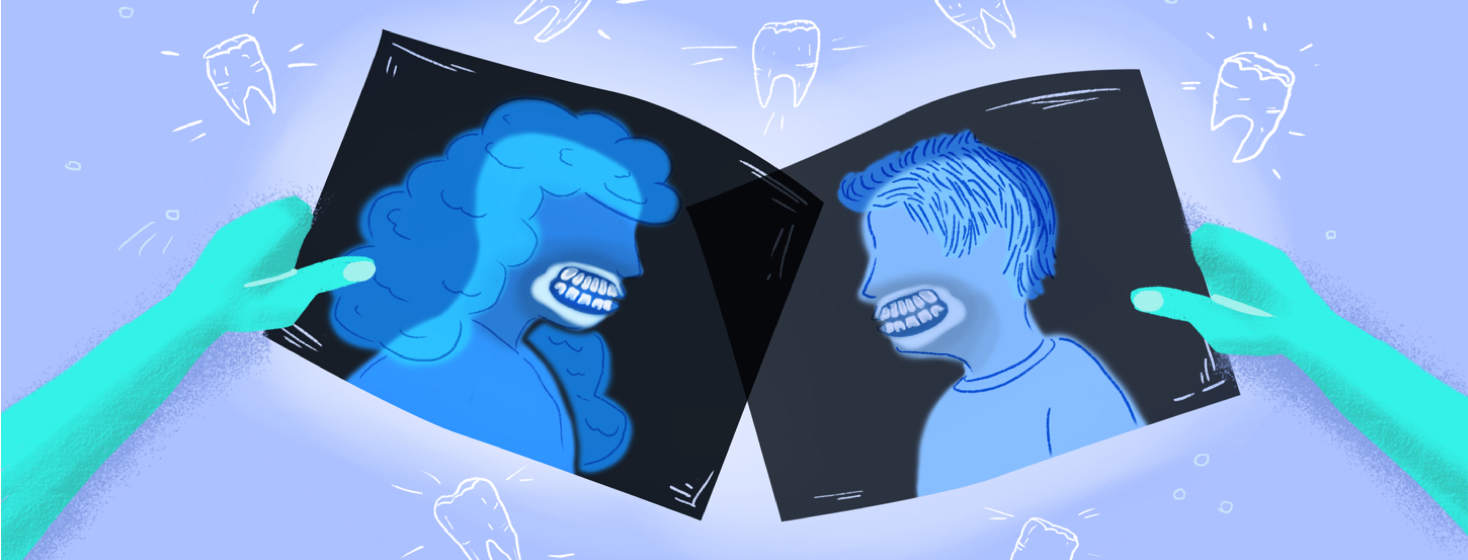Is Teeth Grinding a Sign of Sleep Apnea?
People are often surprised to learn that their dentist suspects they have obstructive sleep apnea (OSA). It seems far-fetched that a routine dental cleaning could end with a potential sleep disorder diagnosis. What do dentists see that leads them to this conclusion?
Dentists look for cavities and infected gums, but they also inspect for damage to the teeth caused by general wear and tear. This includes the overwear of the tooth surface often caused by bruxism, or tooth grinding or clenching. Bruxism, it turns out, is commonly linked to untreated OSA.
What is bruxism?
This refers to the action of grinding or clenching one’s teeth. It’s a common occurrence happening both day and night.
Anxiety and stress are chief reasons why people grind their teeth. For some people, it’s caused by misalignment of the jaw or teeth or as the result of missing or broken teeth.
When it happens at night, it’s called sleep bruxism. And it could also be the result of untreated OSA.
How do you know if you have sleep bruxism?
Most people who grind or clench their teeth during sleep experience the following:1
- Morning headaches
- Sore jaws
- Tooth pain and sensitivity
- Noise complaints from bed partners
- Chipped or cracked teeth without an obvious explanation
- Loose teeth
Seeing a dentist may reveal some of these signs, which the dentist will inquire about to establish the causes. For instance, the COVID-19 pandemic led to greater numbers of people with cracked or broken teeth caused by the impact of anxiety on sleep.2
Dentists will ask about other symptoms like snoring, weight gain, and high blood pressure in order to rule out OSA.
Risk factors for sleep bruxism
Who’s most likely to have sleep bruxism? Here are some common risk factors:3
- Being male
- Having epilepsy, diabetes, acid reflux, or OSA
- Using caffeine, nicotine, or alcohol
- Experiencing stress, anxiety, or depression
Links between bruxism and sleep apnea
For a long time, researchers theorized that people with OSA clenched or ground their teeth while asleep as a protective response to apneas. Clenching your teeth gives the walls of the upper airway some of the tone lost through the relaxation of sleep, helping to keep the airway clear for breathing. However, more recent research points to bruxism as an arousal response following respiratory events such as apneas.3,4
When we recover from apneas, our body may not reawaken fully, but it will arouse from a deeper stage of sleep to a more shallow stage. When we arouse from deeper stages of sleep, the muscles that operate the jaw and chin may briefly tense up, resulting in grinding or clenching.3,4
Regardless of why it happens, sleep bruxism is extremely common in people with OSA. Some studies have found that half of the people with OSA they look at also experience sleep bruxism. That's in contrast to 12 percent in the general population.3
Can using a mouth guard help?
It depends upon the type of device and what it’s built to accomplish.
Mouth guards can help prevent damage
People use these common dental devices (often called “boil and bite”) to protect the surface of their teeth from damage caused by clenching or grinding while asleep. You can often buy these at the drugstore and fit them yourself.
Mouth guards cannot treat OSA
The oral appliances used to treat sleep apnea aren’t the same as the mouth guards people use for teeth grinding. Bruxism mouth guards don’t treat OSA, as they don’t prevent collapsed airways in people experiencing pauses in breathing all night. Dental technicians engineer oral devices (sometimes called mandibular advancement devices) to open the airway by mechanisms that advance the position of the lower jaw. These customized devices are built in a dental clinic lab and fitted to the individual.
On the same team: dentist and sleep specialists
If you visit your dentist for a regular cleaning and they ask you about your sleep or any other seemingly unrelated symptoms, such as high blood pressure, it’s likely they see the wear and tear of possible sleep apnea in your dental assessment.
This isn’t overstepping their scope of practice. Many dentists have some sleep medicine training; some are medically certified in sleep medicine dentistry. They build oral devices and work together with sleep specialists to treat OSA in their patients.
If this is the case, you’ll be referred to a sleep specialist based on your dentist’s recommendation. If you do become diagnosed, qualify for, and are interested in using an oral device to treat your OSA, you may be able to see your personal dentist to get that work done.
Is teeth grinding an issue for you? Share your sleep apnea story or comment below.

Join the conversation